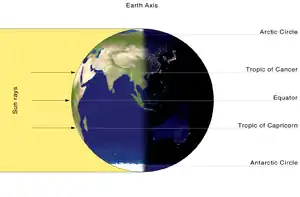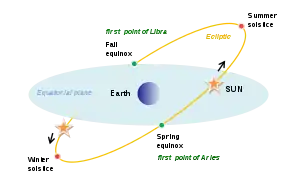equinox
English
Etymology
| PIE word |
|---|
| *nókʷts |


From Middle English equinox, equinoxe, equynox (“one of the two periods in the year when the day and night are of equal length, equinox; either the zodiac sign Aries or Libra, in which the sun crosses the celestial equator”),[1] from Old French equinoce, equinoxe (modern French équinoxe), or from its etymon Medieval Latin ēquinoxium, ēquinoctium, from Latin aequinoctium (“equinox”), from aequus (“equal”) + nox (“night”) (ultimately derived from Proto-Indo-European *nókʷts (“night”)) + -ium (suffix forming abstract nouns).[2][3] The Latin word, ultimately adopted in Middle English and modern English, displaced Old English efnniht (modern English evennight).
The plural form equinoctes treats equinox as if it were a Latin word; the accusative, nominative, or vocative plural of Latin nox (“night”) is noctēs.
Pronunciation
- Singular:
- (Received Pronunciation) IPA(key): /ˈɛkwɪnɒks/, /ˈiː-/
Audio (Southern England) (file) (file) - (General American) IPA(key): /ˈɛkwəˌnɑks/, /ˈi-/
Audio (GA) (file) - Hyphenation: equi‧nox
- Plural (equinoctes):
- (Received Pronunciation) IPA(key): /ˌɛkwɪˈnɒktiːz/, /ˌiː-/
- (General American) IPA(key): /ˌɛkwəˈnɑktiz/, /ˌi-/
- Hyphenation: equi‧noc‧tes
Noun
equinox (plural equinoxes or (rare) equinoctes)
- One of the two occasions in the year when the length of the day and night are equal, which occurs when the apparent path of the Sun (the ecliptic) intersects with the equatorial plane of the Earth; this happens on a day between March 19 and 21 (spring in the Northern Hemisphere, and autumn in the Southern Hemisphere), and on another day between September 21 and 24 (autumn in the Northern Hemisphere, and spring in the Southern Hemisphere); hence, the exact time when the intersection occurs.
- Synonym: (rare) evennight
- 1692 December 15, Richard Bentley, A Confutation of Atheism from the Origin and Frame of the World. The Third and Last Part. […], London: […] H[enry] Mortlock […], published 1693, OCLC 228722054, pages 25–26:
- [T]he Months of March and September, the tvvo Æquinoxes of Our year, are the moſt vvindy and tempeſtuous, the moſt unſettled and unequable of Seaſons in moſt Countries of the VVorld.
- 1793 September 22, Edward Williams, “Ode on Converting a Sword into a Pruning Hook”, in Poems, Lyric and Pastoral. […], London: […] J[ohn] Nichols; […], published 1794, OCLC 223128061, footnote *, pages 160–161:
- The four grand and ſolemn Bardic days are, of ancient uſage, the tvvo equinoxes, and the tvvo ſolſtices; the nevv and full moons are alſo, ſubordinately, ſolemn Bardic days: […]
- 1838 July, Ralph Waldo Emerson, “Milton”, in J[ames] E[lliot] Cabot, editor, The Natural History of the Intellect (Emerson’s Complete Works; XII), Riverside edition, London: The Waverley Book Company, published 1893, OCLC 17217133, page 155:
- [H]e [Milton] believed, his poetic vein only flowed from the autumnal to the vernal equinox; and, in his essay on Education, he doubts whether, in the fine days of spring, any study can be accomplished by young men.
- 1842, Alfred Tennyson, “Will Waterproof’s Lyrical Monologue”, in Poems. […], volume II, London: Edward Moxon, […], OCLC 1008064829, page 194:
- Live long, nor feel in head or chest / Our changeful equinoxes, / Till mellow Death, like some late guest, / Shall call thee from the boxes.
- 1848, Charles Richard Weld, chapter V, in A History of the Royal Society, with Memoirs of the Presidents. […], volume I, London: John W[illiam] Parker, […], OCLC 1342393935, page 100:
- 21. Report the experiments, if conveniently they may, at both the solstices and equinoctes. / 22. Observe accurately the time of the sun’s rising on the top of the hill and below, and note the difference.
- 1854, John Williams, “Pro-consul. b.c. 55.”, in The Life of Julius Cæsar, London; New York, N.Y.: G[eorge] Routledge & Co., […], OCLC 969041631, page 195:
- For [Julius] Cæsar says, that on the night of the fourth day after his landing there was a full moon. He had before mentioned that the summer was far spent, and the æquinox not come, hence, the full moon must have been either in July or August.
- 2005, Clive [L. N.] Ruggles, “Equinoxes”, in Ancient Astronomy: An Encyclopedia of Cosmologies and Myth, Santa Barbara, Calif.: ABC-CLIO, →ISBN, page 148:
- The word equinox is generally taken to refer to the days when, at every point on the earth, day and night are of equal length. But this definition of the equinox is a bit misleading. Since it gets light before the sun rises and remains light after the sun sets, the actual period of darkness at the equinox will be substantially less than twelve hours, the exact amount depending on latitude and how one defines the boundary between twilight and night. […] In practice, one cannot determine the equinox by measuring the length of time between sunrise and sunset.
- 2006, John T. Koch, “calendar, Celtic”, in Celtic Culture: A Historical Encyclopedia, volume I, Santa Barbara, Calif.: ABC-CLIO, →ISBN, §4 (The Seasons), page 332, column 1:
- […] Midsummer’s Day falls near the beginning of summer meteorologically, but was the midpoint of summer in the traditional calendar. Though Midsummer’s Day celebrations are common in the modern Celtic countries, there is no evidence that the ancient Celts celebrated either the solstices or the equinoctes.
- (also figuratively) The circumstance of a twenty-four hour time period having the day and night of equal length.
- c. 1603–1604 (date written), William Shakespeare, The Tragœdy of Othello, the Moore of Venice. […] (First Quarto), London: […] N[icholas] O[kes] for Thomas Walkley, […], published 1622, OCLC 724111485, [Act II, scene iii], page 32:
- [D]oe but ſee his vice, / Tis to his vertue, a iuſt equinox, / The one as long as th'other: […]
-
- (astronomy) One of the two points in space where the apparent path of the Sun intersects with the equatorial plane of the Earth.
- (obsolete)
- (rare) A gale (“very strong wind”) once thought to occur more frequently around the time of an equinox (sense 1), now known to be a misconception; an equinoctial gale.
- 1687, [John Dryden], “The Third Part”, in The Hind and the Panther. A Poem, in Three Parts, 2nd edition, London: Printed for Jacob Tonson […], OCLC 460679539, page 101:
- The paſſage yet vvas good, the vvind, 'tis true, / VVas ſomevvhat high, but that vvas nothing nevv, / Nor more than uſual Equinoxes blevv.
- 1920 September 1, Rudyard Kipling, “The Satisfaction of a Gentleman”, in The London Magazine, London: Hunt and Clarke, […], OCLC 7208306; republished on the website of The Kipling Society, accessed 7 September 2022, archived from the original on 22 December 2021:
- The Equinox drove the sand into their faces or round their legs, as they dived among the sheep-haunted hollows.
-
- (astronomy) A celestial equator (“great circle on the celestial sphere, coincident with the plane of the Earth's equator (the equatorial plane)”); also, the Earth's equator.
- Synonym: (obsolete) equinoctial line
- 1697, William Dampier, chapter IV, in A New Voyage Round the VVorld. […], London: […] James Knapton, […], OCLC 1179524264, page 90:
- [T]hey [seals] are over all the American Coaſt of the South Seas, from Terra del Fuego, up to the Equinoctial Line: but to the North of the Equinox again, in theſe Sea, I never ſavv any, till as far as 21 North Lat[itude].
- (rare) A gale (“very strong wind”) once thought to occur more frequently around the time of an equinox (sense 1), now known to be a misconception; an equinoctial gale.
Alternative forms
- æquinox (obsolete)
Hyponyms
- autumnal equinox
- autumn equinox
- fall equinox
- March equinox
- northward equinox
- September equinox
- southward equinox
- spring equinox
- vernal equinox
Coordinate terms
- solstice
Derived terms
- equinoxial (archaic)
- precession of the equinoxes
Related terms
- equinoctal
- equinoctial
- equinoctially
- equinoctium (obsolete, rare)
- interequinoctial
Translations
|
|
|
See also
- equilux
References
- “ē̆quinox, n.”, in MED Online, Ann Arbor, Mich.: University of Michigan, 2007.
- Compare “equinox, n.”, in OED Online
 , Oxford, Oxfordshire: Oxford University Press, March 2022.
, Oxford, Oxfordshire: Oxford University Press, March 2022. - “equinox, n.”, in Dictionary.com Unabridged, Dictionary.com, LLC, 1995–present, reproduced from Stuart Berg Flexner, editor in chief, Random House Unabridged Dictionary, 2nd edition, New York, N.Y.: Random House, 1993, →ISBN.
Further reading
 equinox on Wikipedia.Wikipedia
equinox on Wikipedia.Wikipedia
Dutch
Etymology
Borrowed from French équinoxe, from Latin aequinoctium.
Pronunciation
- IPA(key): /ˌeː.k(ʋ)iˈnɔks/
- Hyphenation: equi‧nox
- Rhymes: -ɔks
Noun
equinox m (plural equinoxen)
- equinox
- Synonyms: dag-en-nachtevening, equinoctium, nachtevening
Derived terms
- equinoxiaal